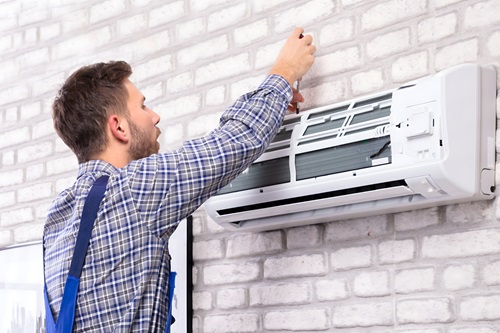 Choosing the correct size air conditioning unit for your home is essential for ensuring optimal comfort and efficiency. There are various factors to consider, and understanding these can help you make an informed decision. Today, you’ll learn about the tips for determining the right size AC unit for your home.
Choosing the correct size air conditioning unit for your home is essential for ensuring optimal comfort and efficiency. There are various factors to consider, and understanding these can help you make an informed decision. Today, you’ll learn about the tips for determining the right size AC unit for your home.
Understanding Air Conditioning Unit Sizes
Firstly, when shopping for an AC unit, you’ll encounter different sizes, usually measured in BTUs (British Thermal Units) and tonnage. The size you need depends on your home’s square footage, insulation quality, and local climate. For instance, larger homes or those in hotter climates will require higher BTU ratings to maintain a comfortable temperature.
Here are some common AC unit sizes based on home square footage:
- 400–500 sq ft: 1 ton (10,000–12,000 BTUs)
- 500–1,000 sq ft: 1.5 tons (14,000–18,000 BTUs)
- 1,000–1,500 sq ft: 2 tons (21,000–24,000 BTUs)
- 1,500–2,000 sq ft: 2.5 tons (30,000 BTUs)
- 2,000–2,500 sq ft: 3 tons (34,000 BTUs)
- 2,500–2,700 sq ft: 4 tons (48,000 BTUs)
- 2,700–3,300 sq ft: 5 tons (60,000 BTUs)
Different Types of AC Units
Additionally, there are various types of AC units, and their size and application can differ. Here’s a brief overview:
Indoor Units: These connect to your home’s ductwork and need to be centrally located. Their size varies by capacity, usually between 18–27 inches in width, 43–54 inches in height, and 19–23 inches in depth.
Outdoor Units: These contain the condenser coils and release heat outside. They are typically between 31–38 inches wide, 31–44 inches high, and 29–34 inches deep.
Window AC Units
On the other hand, window units are designed to fit in a window frame and cool smaller spaces. They can range in size from 15–28 inches in width, 7–20 inches in height, and 12–36 inches in depth.
Ductless Mini Split Systems
Moreover, these systems are great for homes without existing ductwork. They include an air handler (typically 12 inches wide, 39 inches high, and 9 inches deep) and a heat pump (around 24 inches wide, 32 inches high, and 12 inches deep).
 Calculating the Right Size AC Unit
Calculating the Right Size AC Unit
To determine the right size air conditioning unit, several factors must be considered beyond just square footage:
- Climate Zone: The hotter and more humid your climate, the higher the tonnage required to cool your home effectively.
- Ductwork Condition: Efficient ductwork is essential for optimal AC performance. Older or damaged ducts may need upgrading.
- Windows: The number, size, and efficiency of your windows affect cooling needs. Older windows may increase the load on your AC unit.
- Sun Exposure: Homes with significant sun exposure may require larger units to offset the additional heat.
- Insulation: Good insulation helps maintain cool air inside, reducing the workload on your AC unit.
- Ceiling Height: Higher ceilings mean more space to cool, which can require a larger unit.
- Heat-Generating Appliances: Kitchens and laundry rooms generate additional heat, impacting air conditioning performance.
- Occupancy: More people generate more heat, affecting the cooling load.
Signs You Have the Wrong Size AC Unit
If you’re unsure whether your current air conditioning is appropriately sized, watch for these signs:
- Frequent Cycling: An AC that turns on and off too often may be too large for your home.
- Long Run Times: If your air conditioning runs continuously, it may be too small and struggling to cool your home.
- Uneven Cooling: Cold spots near the thermostat and hot spots elsewhere can indicate an oversized unit.
- High Humidity Levels: Poor dehumidification might suggest an undersized AC.
Understanding HVAC Ratings
Furthermore, two key ratings to understand are BTUs and SEER (Seasonal Energy Efficiency Ratio):
- BTUs: Measure the cooling capacity of the unit. More BTUs mean greater cooling power.
- SEER: Measures energy efficiency. Higher SEER ratings indicate more efficient units, which can lower energy costs.
Choosing the right size AC unit is crucial for maintaining comfort and efficiency in your home. By considering factors like square footage, climate, and insulation, you can select a unit that meets your needs. Always consult with a professional like J.C.’s Heating and Air to ensure accurate calculations and the best fit for your home.
Ready to upgrade your air conditioning unit? Contact J.C.’s Heating and Air today to find the perfect solution for your home!
Like our Facebook page for more great info about heating and cooling services.
Areas Served: Corryton, Fountain City, Halls Crossroads, Farragut, Powell, Knoxville, Knox County, Oak Ridge, Lenoir City


 Calculating the Right Size AC Unit
Calculating the Right Size AC Unit
